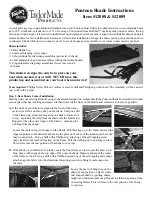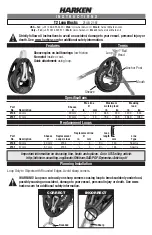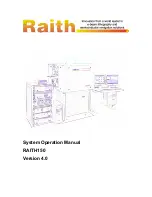
The Presspower 2 has two balanced inputs, each switch selectable for mic
or line level signals. In mic mode, a Bauer RE115Kepc mumetal shielded
transformer provides low distortion, impedance gain of 18 dB and high
common mode rejection. Faraday shields in the transformer and RF beads
used at the input XLR offer broadband RF rejection. Capacitors are also used
for AM band rejection. A phantom power switch applies DC power to both mic
inputs simultaneously. The value of the phantom voltage is dependent upon
the type of power source energizing the Presspower 2. In line input mode, the
mic preamplifier transformer is bypassed and an active balanced input is
employed. The line input is capable of receiving signals up to +23 dBm.
From each input circuit the signal is applied to a potentiometer circuit that
has an audio like taper, allowing fine tuning of the level from the 9 o’clock
through the 3 o’clock range. The 12 o’clock position yields unity gain in either
mic or line mode with approximately 6 dB of gain adjustment 90 degrees in
either direction. Below the 9 o’clock position, the potentiometer attenuates the
signal in larger increments and fully counter clockwise the attenuation is 65
dBm which will mute the input. Above the 3 o’clock position, gain increases
rapidly up to + 20 dBm with the control turned fully clockwise. After the gain
circuits, the signal passes through a switchable low cut filter. The filter has a 24
dBm per octave slope, down 3 dBm at 120 Hertz. This filter is recommended for
mic use as it eliminates low frequency handling and wind noise.
The inputs signals are then summed and applied to two separate output
busses, one for mic level outputs and one with an additional 20 dB of gain for
line level outputs. The line level feed also is applied to the headphone monitor
section and the LED level display. The mic and line level busses are routed to
the active jack boards via a balanced cable harness with plug terminations. The
Expander receptacle is also connected at this point in the circuit.
At each of the 16 outputs of the Presspower 2 or its expander module, the
mic/line switch selects the mic level or the line level signal buss and delivers it to
a buffer circuit which drives a whirlwind TRSP-1 balancing transformer. In mic
output mode a resistive H pad is switched into the circuit to attenuate the signal
by 20 dB. The H pad also provides a ground reference relative to pins 2 and 3 of
the XLR, but not connected to any other ground, which minimizes possible
ground loop problems. In line output mode, pin 1 of the output XLR is left
floating. A 3.5 mm mono jack is provided for each output.
The tone oscillator applies a 1 kHz sine wave to all outputs for level
calibration during setup. The tone level is +4 dBm or 0 VU in line mode and -43
dBm in mic mode.
The headphone driver circuitry provides monitoring of the Presspower 2
output. Each earpiece is powered by a separate amp circuit ensuring that
Tip/Sleeve headphone connectors (which short the ring) will not short out the
entire signal. The headphone amps are capable of driving 0 dB into 30 ohm
headphones, which can significantly reduce battery life. When only using
battery power, turn the headphone level full counter clockwise or unplug the
headphones to conserve the batteries. The taper of this level control is similar
to the control on the inputs.
A 20 segment LED level meter with a 3 dB per segment resolution provides a
wide range of display with 1 dB accuracy. Two switches are provided to help
maximize battery life when using 9 volt battery power. Under battery power only
select dot mode to calibrate levels and use the meter on/off switch to turn the
LED display off when not required. Use the bar mode when the Presspower 2 is
under AC power.
The Presspower 2 has a versatile unipolar power supply allowing the unit to
operate from 120 VAC 60 Hz, 230 VAC 50 Hz, 4 internal 9 volt batteries or any
battery or regulated DC source from 12 to 36 volts. Any combination of the
three types of power can be used simultaneously. The unit will automatically
select the highest voltage, providing fail safe backup and making it easier to
power in remote applications. Under AC power a toroid power transformer is
used internally for superior performance and a voltage switch on the back
panel selects 120 or 230 VAC. Nine volt batteries are mounted on the front
panel in convenient quick change holders. An external DC input (screw type)
on the back panel will accept 12 to 36 volts DC, from either batteries or a
regulated source. This allows use with camera belt packs, car batteries, etc. At
12 volts DC with a -40 dB mic input and 40 dB of gain, the Presspower 2 will
ouput up to +8 dBm in line mode.
The power on/off switch turns both the AC and the internal 9 volt battery
power on and off. The external DC input on the back panel is unswitched. The
AC LED illuminates when AC power is present and is switched on. The DC
power LED functions as a battery check LED for the 9 volt batteries and
illuminates when 12 VDC or more is present at the external DC power input.
With no external DC, the DC LED will light when the batteries are good and the
power switch is on. When the total series voltage drops below 27 volts the DC
LED goes out and all four batteries should be changed.
THEORY OF OPERATION





















